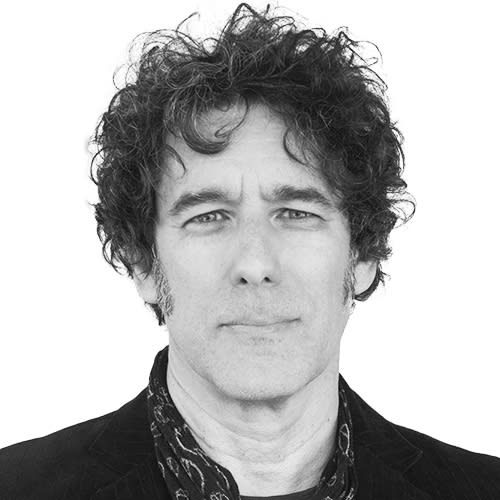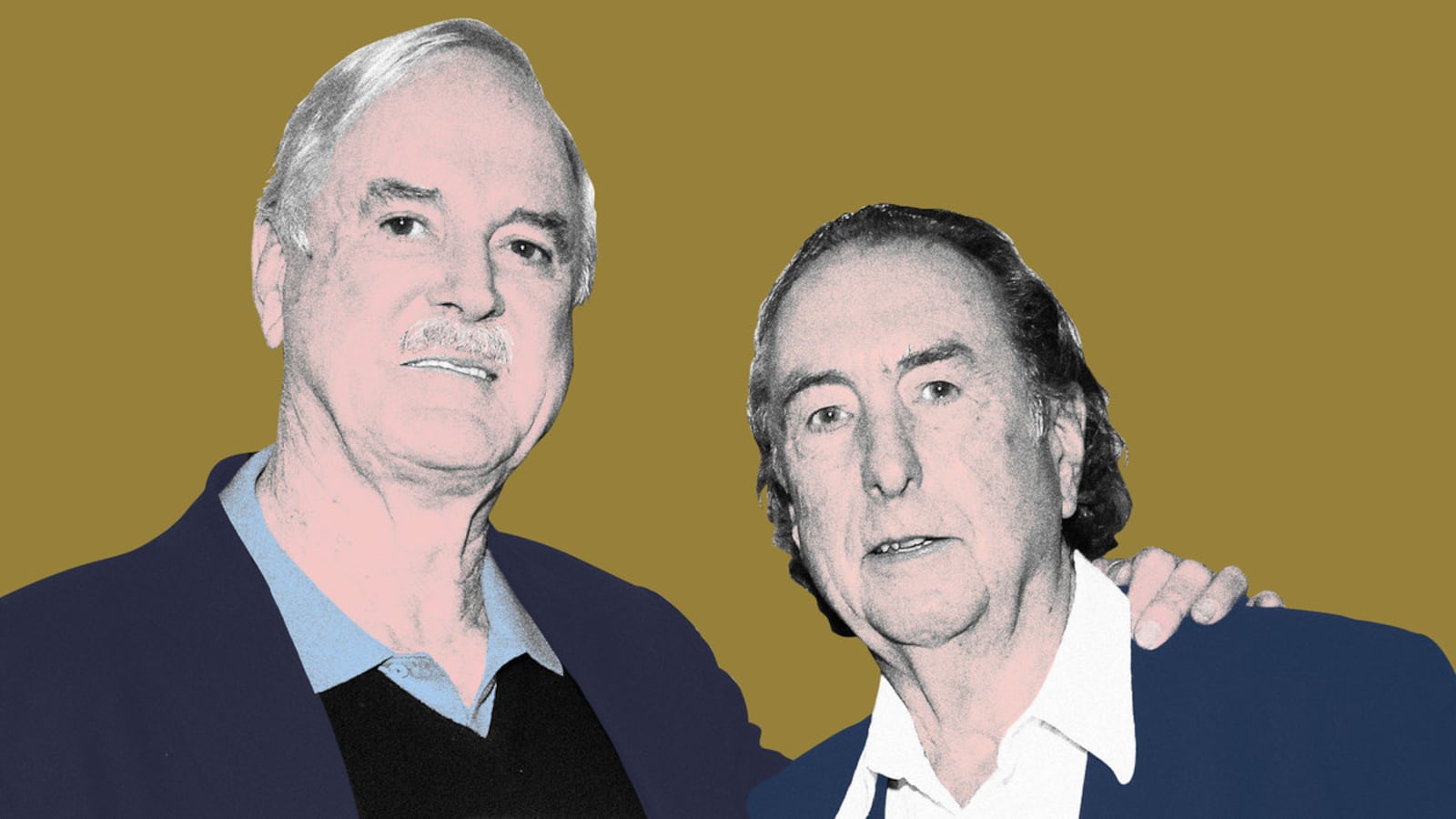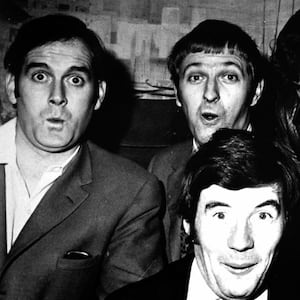George Harrison was reportedly fond of saying that the spirit of The Beatles had transferred into Monty Python. The groundbreaking comedy troupe, whose original television show, Monty Python’s Flying Circus, celebrates its 50th anniversary this fall, broke every rule of the stuffy entertainment business they could, and confounded critics and executives, just like The Beatles, for sure. But it was the anarchic, we-don’t-give-a-fuck spirit the two groups shared that truly set them apart.
“I like to call The Beatles the Pythons of rock,” says Eric Idle, who counted Harrison as one of his closest friends, and who satirized the group in 1978 with his loving mockumentary All You Need Is Cash, about Beatle doppelgangers The Rutles. “I always felt that The Beatles succeeded in America because they were funny. That first press conference identified them as these extraordinary people with long hair and big noses who were just hilarious. ‘How do you find America?’ ‘Turn left at Greenland.’ They did all that live, just off the plane. I mean, Ringo didn’t look like he belonged in a group. Lennon’s books were hilarious. And I think that’s what people fell in love with. They were fast and furious between each other.”
Monty Python’s Flying Circus is out in a deluxe “Norwegian Blu-ray” edition this week—“we agreed that we’d celebrate the 51st anniversary, just amongst ourselves,” Idle admits with a chuckle—and looks better than ever. It’s been painstakingly spiffed up from the original video, film and animation sources that, best of all, makes the comedy feel as fresh as ever.
“I have a lot of people come up to me, older people, men and women, to talk about Python, and the really sweet thing is, there’s a tear in their eye,” Idle’s fellow Monty Python alum John Cleese tells me. “You realize, it’s not just laughter. There is some kind of emotional connection that these people think or feel like I do. My only disappointment is it’s been rather forgotten in the U.K. During the O2 shows, the Daily Telegraph wrote an article, ‘Was Python ever really funny?’ And the only thing you can say is, ‘Well, a lot of people thought so.’ Because lot of people did. So it’s sad when your own country is the one that seems to lag behind.”
“You’re still fresh to some people, and they keep discovering it,” Idle counters. “People who think about Python were fans when it was on, and they were big fans. But now, they don’t think about it. But when they see it, it’s still funny to them, too.”
Warming to the fight, Cleese continues.
“Another journalist went on about Monty Python and its 50-year-old jokes. I thought, ‘Well, I’m sure lots of people don’t think it’s funny at all. But let’s not pretend that there aren’t a lot of people who do like it.’ Michael Palin has pointed out several times that the BBC hasn’t put Flying Circus on for nearly 20 years. So that’s odd, of course, but then people just don’t know it. But a lot of young people came with their parents to the O2 and discovered it and loved it. So I think it’s a press thing, and I don’t think it’s to do with the people. But of course, the press creates an impression. So hopefully this box set, and the Netflix deal, will rectify that,” he says, referring to a deal that made much of Monty Python's output, including Flying Circus, available on the streaming platform last year.
“I don’t read the English newspapers,” Idle retorts. “I’ve had about 25 years here in California, and I’ve never read a single English newspaper during all that time. In fact, one of the nicest things about living here is not reading English newspapers.”
Cleese is also pleased that the troupe’s diehard fans will get a healthy dose of bonus material, including deleted scenes, lost sketches, and extended versions of some of the classics.
“I didn’t see anything and think, ‘Oh gosh, why wasn’t that in the show?’” he confesses. “But I think it’s just enough for the people who want to be experts on Python.”
“I was absolutely very, very impressed,” Idle says of the remastering job of the original Monty Python series. “I think it’s been a good and valuable thing to do. It cost us a lot of money, but I think it was a very good thing to do because it looks amazing. That’s what you can do with digital. Even the filmed segments, because we had a pretty bad cameraman. A lovely man, Jimmy Balfour, but everything he shot was pretty substantially dark! So it’s a fantastic thing.”
The pair also have mostly fond memories of their first rush of fame, from 1969, when the series launched, until 1975, when the troupe’s first feature film, Monty Python and the Holy Grail, became a worldwide cult hit.
“What I remember quite clearly is when we were filming, because we went after different locations each time,” says Cleese. “So I have clear memories of shooting Dennis Moore on the island of Jersey, or shooting Scott of the Antarctic, on a beach in Torquay. And, of course, I remember going to Graham’s house to write, and that we usually got curries in at lunchtime. And I remember the endless arguments between me and Terry [Jones] while the others sort of sat there and let us slug it out!”
Idle, who released a bestselling memoir last year, is prepping a deluxe and expanded edition of the book for the bespoke publisher Genesis Publications. Full of rare photographs and in-progress lyric sheets, in a signed, numbered edition, it’s aimed at the diehard fan. “But I’m quite happy if people buy the paperback,” he quips.
Idle, who says he’s still always writing, also has hopes that the film version of his hit Broadway musical Spamalot will hit the silver screen sometime soon.
For his part, Cleese, who just turned 80, is remarkably busy. He’s adapting Monty Python’s beloved film Life of Brian for the theater—“but not a musical,” he says—as well as a stage adaptation of a Georges Feydeau farce called Bang Bang and Fawlty Towers for the West End. He just appeared in the second season of the British sitcom Hold the Sunset (available here via BritBox), is on a seemingly never-ending live tour, and he’s writing all the time, including beginning work on the second volume of his memoir.
“It will cover Python and Fawlty Towers and probably A Fish Called Wanda,” he says. “I’ll be going into the sketches in much greater detail and doing analyses. Last time people said there wasn’t enough Monty Python—because there was hardly any—and probably this time people will say there’s too much about it. But that won’t matter, because they can skim. I’m explaining why I thought this sketch was superior to that sketch, and the fans will love it.”
While Monty Python’s Flying Circus was more subversive than political, both Cleese and Idle are active on Twitter, and are closely following the Brexit “shitshow,” as Cleese calls it, and Trump’s impending impeachment.
Idle admits that, during a break from his busy schedule, he recently became addicted to MSNBC.
“The problem is, the way they cover everything, you constantly think, ‘They’ve got him!’” he says of the coverage of Trump’s travails. “Like they’re coming for him with the handcuffs. The golden handcuffs, of course.”
“It’s been quite clear to me from the very beginning that he is not mentally balanced,” Cleese says of Trump. “He is an extraordinary caricature of an asshole; a person who has no interest in anyone else except himself. Every time he makes a decision, no matter how impulsive it is, it’s the one that makes him feel best about himself for the next 20 minutes. But I think now, for the first time, because he is really becoming a disaster in foreign affairs, some Republicans are beginning to notice it. But the people who support him are basically so ignorant, because they only ever get news from Fox News, I don’t know what you say to people like that. To me, it’s like people who go and watch professional wrestling and don’t realize that it’s fixed. If they can’t see it when it’s right under their nose, I have no idea how they’re going to realize how wrong they are.”
Idle agrees. “He’s stark raving mad. Absolutely mental. He’s a criminal and a con artist and a mob boss.” But he has faith in America.
“America was founded by people who drew up a Constitution that accounted for somebody like Trump,” he says. “They wrote down laws to guard against it. They don’t have that in England. And that’s why they’re in the mess they’re in over there.”
He also draws comfort in the lessons of the Watergate era.
“When we were first touring here, in Canada, actually, the impeachment hearings were on,” Idle says. “It was amazing and riveting. But it was a lesson in how resilient America is, too. William Barr is nothing more than this era’s John Mitchell, and you can see how well that turned out for him.”
For his part, Cleese has less faith in the Republicans in Congress.
“This is the best job they’re ever going to get,” Cleese says, emphatically. “The better-known ones will go on living well, of course. But the rest of them will have to go back to being assistant manager in a shoe shop!”
“They’re terrified of Trump, sure,” contends Idle. “But do you know what they’re really terrified of? If you think the Russians only hacked Hillary Clinton and the DNC, you’re a fool. They hacked everyone! The RNC, Mitch McConnell and, especially, Lindsey Graham. That’s why they’re all so docile. But don’t be fooled that they’re doing this out of allegiance to Trump, or even because they fear his base. They’re afraid of what Russia has on them!”
Cleese, who often draws fire on Twitter from both sides, is adamant that we can trace the state of things to the current condition of the newspaper industry and the rise of social media.
“When I said, I’m out of here, nobody took me seriously,” recalls Cleese, who left England for good, he says, last November. “But I don’t want to be in a place where you can’t trust a single newspaper. London used to be much more interested in the arts than what was the latest takeover. I was brought up in a culture which for all its faults, was pretty civilized and wasn’t vulgar. I was lower-middle class, but it was a middle class culture. Now it’s a tabloid culture across the board.”
“As for the rise of social media in our lives, I think it’s a disaster,” he says as we wrap up. “All we have as human beings is our interpersonal skills. And I think that almost everything that social media has done has been making that worse. And trying to persuade young people that building up their egos is what they should be spending their time on is farcical. There’s a very fine book called Technopoly written by Neil Postman, in which he points out that, with every technological advance, there’s always gains and there’s losses. But that the people who come up with the technology have to be smart enough to realize that other people can use those advances against them for malign purposes. When I wrote my books with Robin Skinner, I came to the view that there was no system that humans couldn’t… destroy. It all depends on whether you’re talking about decent people or not. The system doesn’t matter so much as the fact that it relies on people behaving decently. There is a tendency in America toward predatory capitalism. And there’s nothing more destructive to society than the idea that the only thing that matters is money. Because that’s basically sociopathic. So I think that the greatest problem in the world at the moment is greed.”







